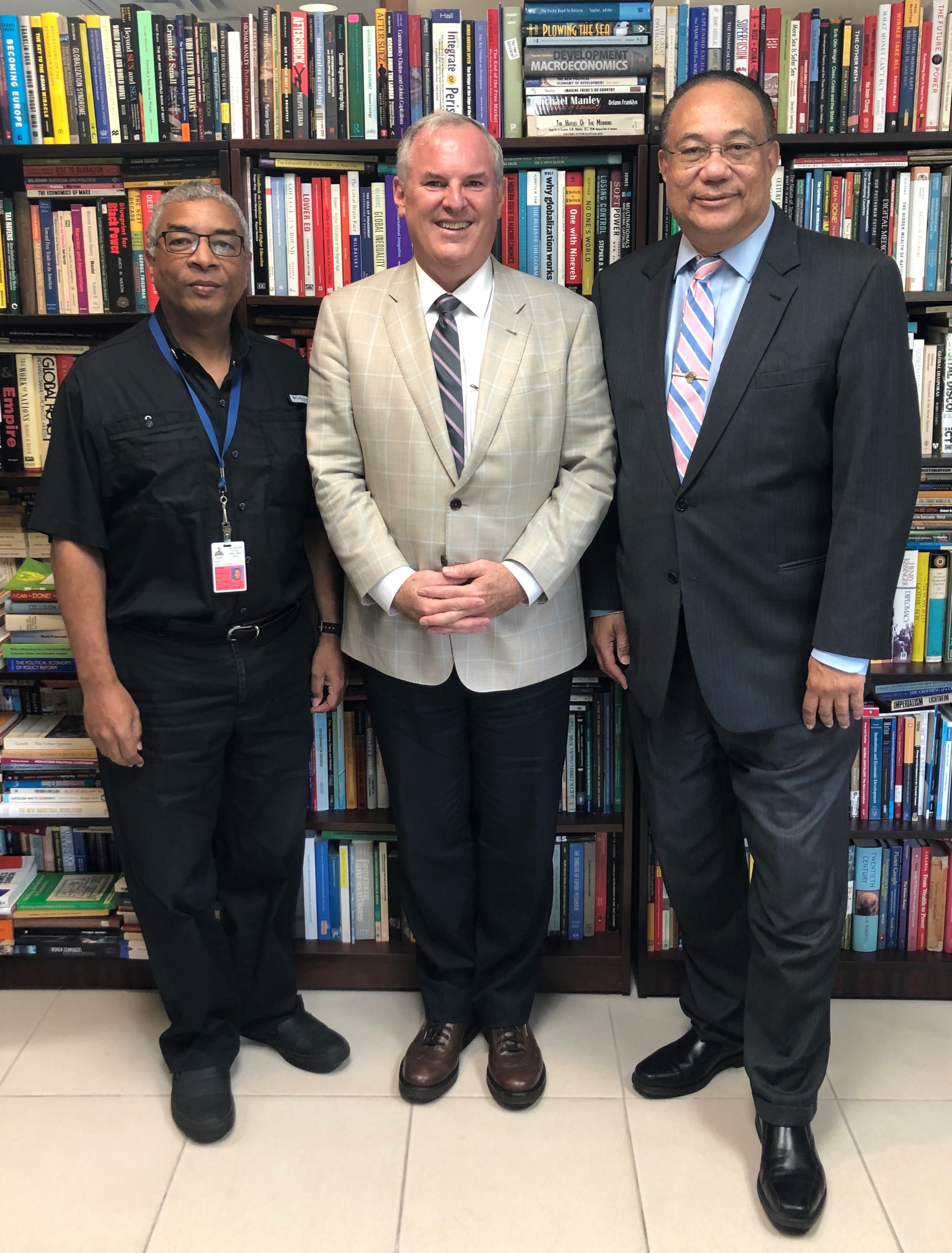News Releases
The UWI is the newest member of the Global Resilience Research Network
For Release Upon Receipt - October 29, 2019
UWI

Regional Headquarters, Jamaica. 29 October 2019—The University of the West Indies (The UWI) is the newest member of a growing network of over 30 leading universities and institutes engaged in resilience research—the Global Resilience Research Network (GRRN).
Launched in 2018, under the auspices of the Global Resilience Institute (GRI) at Northeastern University in the US, the GRRN is a worldwide body which informs the development of new tools and applications to advance resilience best practices. As a partner in the GRRN, The UWI will contribute its technical expertise through faculty researchers in sustainability, resilience, and disaster risk reduction. Among The UWI experts who will serve on the GRRN are Dr. David Smith, Coordinator, Institute for Sustainable Development and Director, Centre for Environmental Management; Dr. Barbara Carby, Director, Disaster Risk Reduction Centre; Dr. Lloyd Waller, Director of the Global Tourism Resilience and Crisis Management Centre (GTRCMC), as well Consultant for Disaster Resilience at The UWI Office of Vice-Chancellor and Honorary Research Fellow Institute for Sustainable Development, Mr Jeremy Collymore.
Significantly, The UWI is expected to be a key contributor to the GRRN’s Island Resilience Initiative (IRI). This initiative aims to develop an action plan for a US-Caribbean Resilience Partnership, a commitment made earlier this year by 18 Caribbean higher education institutions across the region.
IRI takes a system-of-systems approach that recognises the interdependencies among the built, natural, and social elements of communities and societies.
On October 10, GRI’s Founding Director, Dr. Stephen Flynn, met with The UWI’s Pro Vice-Chancellor for Global Affairs, Ambassador Dr. Richard L. Bernal and Dr. David Smith at the University’s Regional Headquarters in Jamaica to identify next steps for joint efforts.
Professor Flynn expressed his honour to be partnering with The UWI on this important initiative. He noted, “Distinguished scholars at The UWI have been making invaluable contributions not only to our understanding of the challenges that validate the need for improving societal resilience, but most importantly in providing leadership in developing innovative solutions”.
Ambassador Bernal welcomed the opportunity that participating in GRRN provided for deepening collaboration among institutions of higher education around the global resilience imperative. “There is an urgent need to develop solutions that respond to climate change and other disruptive risks in ways that support the goal of building more equitable and sustainable societies,” he said. The UWI is looking forward to being an active participant in the Global Resilience Research Network, providing the thought leadership and practical solutions to respond to that need.”
End.
Photo Caption:
L-R: Dr. David Smith, Coordinator, Institute for Sustainable Development and Director, Centre for Environmental Management, The UWI; Dr. Stephen Flynn, Founding Director of the Global Resilience Institute at Northeastern University, Boston, Massachusetts, USA; and Ambassador Dr. Richard L. Bernal, Professor of Practice, Pro-Vice-Chancellor of Global Affairs, The UWI.
About the Global Resilience Institute (GRI)
Based at Northeastern University in Boston, Massachusetts, the Global Resilience Institute’s research and education mission is to develop and deploy practical and innovative tools, applications, and skills that drive social and technical changes, which strengthen the capacity of individuals, communities, systems, and networks to adapt to an increasingly turbulent world. Launched in 2017, GRI is the world’s first university-wide institute to respond to the resilience imperative. Today, GRI undertakes multi-disciplinary resilience research and education efforts that draw on the latest findings various sectors. GRI works in close partnership with industry, government, communities, and non-governmental organisations, as well as engages in external outreach to inform, empower, and scale bottom-up efforts that contribute to individual and collective resilience. To learn more about GRI, visit gloablresilience.northeastern.edu.
About The UWI
For over 70 years The University of the West Indies (The UWI) has provided service and leadership to the Caribbean region and wider world. The UWI has evolved from a university college of London in Jamaica with 33 medical students in 1948 to an internationally respected, regional university with near 50,000 students and five campuses: Mona in Jamaica, St. Augustine in Trinidad and Tobago, Cave Hill in Barbados, Five Islands in Antigua and Barbuda and an Open Campus. As part of its robust globalization agenda, The UWI has established partnering centres with universities in North America, Latin America, Asia, and Africa including the State University of New York (SUNY)-UWI Center for Leadership and Sustainable Development; the Canada-Caribbean Studies Institute with Brock University; the Strategic Alliance for Hemispheric Development with Universidad de los Andes (UNIANDES); the UWI-China Institute of Information Technology, the University of Lagos (UNILAG)-UWI Institute of African and Diaspora Studies and the Institute for Global African Affairs with the University of Johannesburg (UJ). The UWI offers over 800 certificate, diploma, undergraduate and postgraduate degree options in Food & Agriculture, Engineering, Humanities & Education, Law, Medical Sciences, Science & Technology, Social Sciences and Sport.
As the region’s premier research academy, The UWI’s foremost objective is driving the growth and development of the regional economy. The world’s most reputable ranking agency, Times Higher Education, has ranked The UWI among the top 600 universities in the world for 2019 and 2020, and the 40 best universities in Latin America and the Caribbean for 2018 and 2019. The UWI has been the only Caribbean-based university to make the prestigious lists. For more, visit www.uwi.edu.
Contact
Marketing and Communications Department
- Tel.: (868)-662-2002 ext.2013/2014
- Email: marketing.communications@sta.uwi.edu

